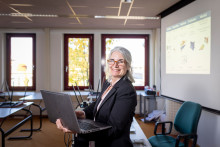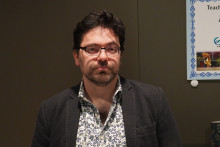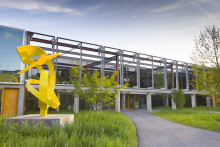Aidin Niamir was just a fraction away from pursuing a career in music. It was his dream to become the conductor of the Vienna Philharmonic Orchestra and Iranian-born was endlessly impressed by the compositions of Antonin Dvorak. After being accepted into two prestigious American music schools, the only thing standing in the way was a visa. But political tensions between the USA and Iran crushed his dream: ‘I can still see the officer’s stamp on my visa application. It said “reject”.
Unable to live off music in Iran, Aidin needed to look for another mission in life. And he successfully found one. Aidin’s love for music was relocated to private life, whereas his love for nature became his profession. ‘The best times from my childhood were hiking in nature with my parents.’ His dad, being a regional planner, continuously pointed out to son Aidin that human footprints were beautiful or ugly depending on their alignment with their natural surroundings.’
Where, why and when?
Being an adult now, the PhD candidate is still interested in surroundings. Impressive work experience at the large consultancy company Rah Shahr and various short courses at ITC took him to a PhD position in Twente. Aidin uses information about environmental characteristics to predict the distribution and movement of species. ‘I want to know where they are, why they are there and when they are there.’ This task is not easy: ‘There are so many tiny elements at play. The direction of slopes, proximity to humans or the presence of vegetation types, to name a few.’
During his Master thesis at ITC, Aidin researched these elements for the short-toed eagle. ‘There was not much reliable information on this eagle’s whereabouts. I assumed that it would be dependent on the presence of their prey: snakes.’ In Malaga, Aidin hunted for snakes and observed from behind the bushes. Indeed, the snakes were a good indicator of the presence of this eagle, making it easier to draft maps on them elsewhere.
Preserve knowledge
‘For my PhD, I collect knowledge of other experts and develop models accordingly,’ Aidin clarifies. He finds this especially rewarding in developing countries, where nature is not extensively monitored by sensors and other equipment. ‘In Iran, we still do not know enough about the population of key species. We are dependent on experts and their large experience with nature instead of data. I am happy to interview these experts, create a knowledge base and generate rules from that. When a person in the field passes away, at least the knowledge will survive.’
As no other, Aidin realizes the importance of environmental factors to species. And simultaneously, its vulnerability. ‘Humans are no spectators. We are part of nature. We should not underestimate the impact of political and economic decisions to the environment. In time of political tensions, conservation is automatically a lower priority. However, economy and politics have national borders. Nature does not. Therefore, the impact of decisions is not local, but global.’ Aidin illustrates the influence of economy: ‘When people don’t have enough money for the basics, they will stop using gas and start chopping wood for heating and cooking. People will start hunting, too. In Iran, duck hunting has become very popular ever since the chicken price got so high. This issue is particularly dear to me. When I finish my dissertation I will flag it.’







